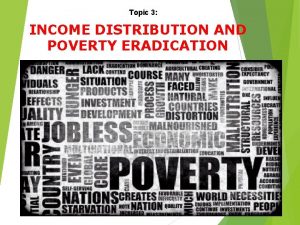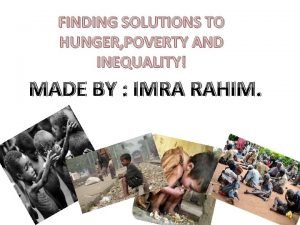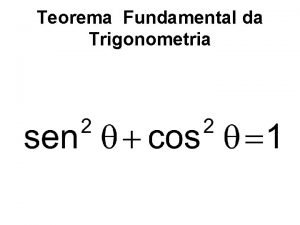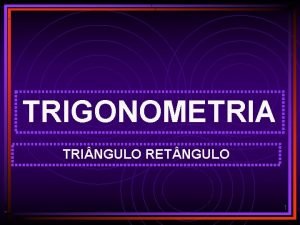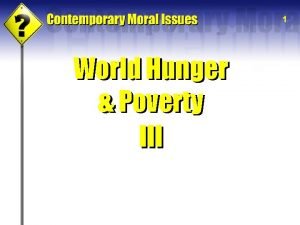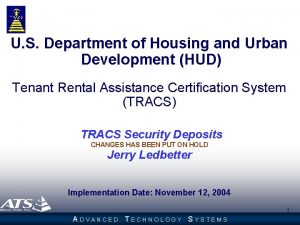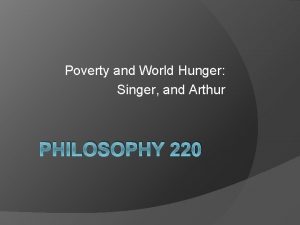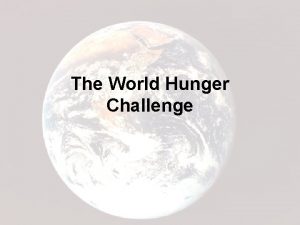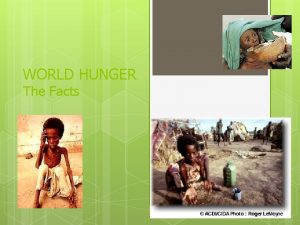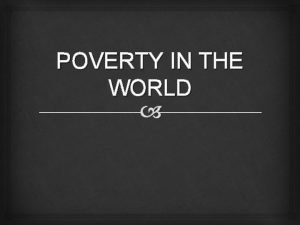Philosophy 220 World Hunger and Poverty Sen and













- Slides: 13

Philosophy 220 World Hunger and Poverty: Sen and O’Neill

Sen, “Property and Hunger” Sen offers us a rights-based approach to the issues of poverty and hunger. The right that he directs our attention to is the right to property. To appreciate the significance of this right, he insists that we locate it in a general theory of rights which accounts for their moral significance and implications.

The Moral Importance of Rights On Sen’s account, the moral significance and import of a right can be accounted for in three ways. 1. The instrumental view: rights don't matter on their own; only their consequences matter. 2. The constraint view: rights matter on their own; consequences do not matter. 3. The goal view: rights matter on their own; their consequences matter as well.

Two Conclusions Elsewhere, Sen has argued in favor of the goal view of rights, basing his argument on the intrinsic significance of basic human rights. Even without this argument, Sen insists that we should draw two conclusions from this account of the moral significance of rights. We must distinguish between the intrinsic value of a right and the overall value of a right. No moral assessment of a right can be independent of its likely consequences.

What About Property? Though a right to property is often assumed to be intrinsically good, Sen’s review of arguments justifying the right to property reveals that it is typically defended by the instrumental view (i. e. , by it’s consequences). While there may be many good consequences of property, there are clearly negative consequences as well, most importantly for our purposes, poverty and hunger.

Property, Poverty and Hunger When we consider how property contributes to poverty and hunger, two features of property rights come to the fore. Endowments: a person’s starting point; the property/wealth bequeathed to them. Exchange entitlements: the benefits through exchange procurable from the endowment. From this point of view hunger and poverty are a result of a lack of endowments/entitlements to wealth/food. Sen uses a number of examples to show that availability of food can be, but not need be a factor.

A Social Response Given the unavoidable inequalities of endowment and resulting exchange entitlements, the only way to address poverty and hunger are through institutional (structural) reform. Sen argues that we should increase the entitlements of deprived groups by: 1. increasing food production; 2. adjusting how food is distributed; 3. reducing entitlements of more prosperous groups.

Right not to be hungry Obviously, such a right only makes sense if the right to property is not absolute. There’s no reason to assume that it is (other rights are not; we recognize a number of legitimate restrictions-zoning laws, eminent domain). More importantly, an account of basic human needs provides strong support for the existence of a right to adequate resources to provide for these needs. Such an argument can be justified by any of the views of rights we’ve considered. Sen uses the example of India to demonstrate that institutional structures assuming such a right are consistent with our other social goals.

O’Neill, “A Kantian Approach” O’Neill’s starting point is Kant’s Humanity formulation of the categorical imperative. As we discussed it, this formulation requires two things: do not treat others as mere means; do treat others as ends in themselves. As O’Neill insists, these requirements have clear implications for questions of hunger and poverty.

Justice and Beneficence On O’Neill’s account, the humanity formulation imposes obligations to justice and beneficence. With regard to justice, the humanity formulation requires us to acknowledge that we cannot deceive or coerce people (remember “voluntary informed consent”). With regard to beneficence, the key is the requirement to respect people as rational and autonomous beings. As Kant specifies it in his analysis of our duty to beneficence, this means we have an obligation to support the capacity of others to be ends in themselves.

What does Justice require? Clearly, people suffering from hunger and poverty are vulnerable in a number of ways to those more fortunate. We benefit from the lack of development in other countries with cheap products that make our lives easier and more comfortable. Kant’s analysis of our obligation to justice provides the basis for a series of questions about our economic relations with such countries, and the advantages we secure from them.

What does Beneficence require? Similar analyses are offered from the perspective of our obligation to beneficence. While the imperfectness of the duty from Kant’s perspective limits the capacity to address any specific situation, Kant’s analysis clearly reveals our obligation to participate in economic relationships that are maximally respectful to the humanity of the parties involved. Our goal should be to act in such a way as to encourage and develop the autonomy of less fortunate trading partners.

Kant vs. Utilitarianism Kantian Moral Reasoning: does not rank all possible institutional arrangements; is in principle less sensitive to issues concerning what will cause what. Utilitarian Moral Reasoning: requires ranking all possible courses of actions; thus, requires much more causal knowledge than Kantian moral reasoning; unlike Kantian reasoning, may allow or even require shortterm neglect or abandonment.
 Relative and absolute poverty
Relative and absolute poverty Poverty and hunger solutions
Poverty and hunger solutions Sen (1)
Sen (1) Periodo sin^2 x
Periodo sin^2 x Tangente de 0 90 180 e 360
Tangente de 0 90 180 e 360 Bayram özünü bildi bileni anda buldu
Bayram özünü bildi bileni anda buldu John arthur world hunger and moral obligation
John arthur world hunger and moral obligation Sun yat sen ap world history
Sun yat sen ap world history Relative and absolute poverty
Relative and absolute poverty Juvenile delinquency and poverty
Juvenile delinquency and poverty Esperanza’s house symbolizes poverty and
Esperanza’s house symbolizes poverty and St john chrysostom on wealth and poverty pdf
St john chrysostom on wealth and poverty pdf Symbolic interactionist perspective on poverty
Symbolic interactionist perspective on poverty Hudco full form
Hudco full form
